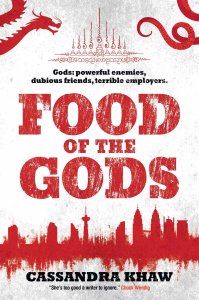Liz Bourke reviews Cassandra Khaw’s Food of the Gods
Food of the Gods, Cassandra Khaw (Abaddon 978-1781085196, $15.00, 320pp, tp) May 2017.
 Food of the Gods is a mosaic novel, of sorts. It collects three linked novellas by Cassandra Khaw that, together, form a whole arc. At least two of these novellas have already been published as standalone e-books. The first of these is called ‘‘Rupert Wong, Cannibal Chef’’, and if I tell you it really does live up to the title, you’ve got some idea of the flavour of the novel as a whole.
Food of the Gods is a mosaic novel, of sorts. It collects three linked novellas by Cassandra Khaw that, together, form a whole arc. At least two of these novellas have already been published as standalone e-books. The first of these is called ‘‘Rupert Wong, Cannibal Chef’’, and if I tell you it really does live up to the title, you’ve got some idea of the flavour of the novel as a whole.
Only some idea, though, because Food of the Gods is more energetic, more vibrant, more appealing, and more downright weird that even ‘‘cannibal chef’’ might imply.
Some of that weirdness, I’ll admit, is purely due to my unfamiliarity with the myths and folklore that Khaw is using. ‘‘Rupert Wong, Cannibal Chef’’ is set in Malaysia – in Kuala Lumpur, to be precise – and the second novella, ‘‘Rupert Wong and the Ends of the Earth’’ opens there as well. With pantheons and supernatural beings I’d never really encountered before, Food of the Gods demanded that I pay attention just to keep up, but it rewarded that attention: while Food of the Gods might hold the appeal, in part, of novelty, its individual parts are tight, tense, well-constructed examples of urban fantasy.
Rupert Wong works for ghouls in Kuala Lumpur, thanks to some deals he made to lower the amount of time he’ll spend in Hell. He’s a chef. The food he prepares is, naturally, made from humans: if you have a dodgy stomach, this is not the book for you, because Khaw delights in the gruesome throughout. The entertainingly gruesome… but still, preparing human meat for consumption is a taboo that Khaw doesn’t just play with: they cut it open, pull out its entrails, and roll around in them.
In the course of ‘‘Rupert Wong, Cannibal Chef’’, Rupert gets involved in the affairs of dragons – a family affair, involving a murder, and also involving the Furies, visitors to Malaysia from abroad. This complicated political landscape enmeshes Rupert in intrigues, and in consequences: flippant, irreverent Rupert is no one’s idea of a canny diplomat. His attempts, in the course of these supernatural politics, to protect (and bargain for the salvation of) the no-longer-exactly-a-woman he loves earn him enmity from several interested parties.
In ‘‘Rupert Wong and the Ends of the Earth,’’ the consequences of Rupert’s earlier actions catch up with him. He has to go to London – to Croyden, to be exact – where his ghoulish bosses have loaned him out to the Greek gods who’ve made London their new home. There, Rupert finds more supernatural politics. And gruesome shit. And in the third part of this linked narrative, ‘‘Meat, Bone, Tea’’, the new gods of chaos offer Rupert – still stuck in London, far from home – a deal.
Khaw writes with vivid energy. Rupert’s cynical and irreverent voice as a narrator is immensely appealing, and Rupert himself is a fairly compelling character: aware that his residual morals sometimes make him a hypocrite, and more wearily resigned than shocked at every new horror that intrudes into his life. He is perpetually on the lookout for his own advantage and survival – which is compelling and amusing once you realise that Rupert is just a bit cleverer than he lets on.
How does Food of the Gods work as a whole? It’s episodic, since the first two parts – the independently- published novellas – can stand alone, but thematically and in mood, it stands very well as a unity.
Its major unifying theme is that gods and demons, regardless of pantheon, are assholes. (No, really, they’re assholes.) And across its parts, Food of the Gods has a deep concern with domestic violence, especially violence against women, and how many obstacles stand between women and any escape from the violence they are subjected to – much less justice. Food of the Gods is also concerned with the lengths women will go to in order to achieve an end to the violence to which they are subject – or justice, or revenge.
This is also an urban fantasy with very modern concerns. Food of the Gods is intensely interested not in colonialism alone, but in the realities of a post-colonial world, both in supernatural and in human terms. Seen through Rupert’s eyes, London and Croyden become strange: a familiar setting become exotic (I hate that word, but it works), seen through unfamiliar eyes. It reverses the exoticisation of non-European (and non-North-American) places and peoples that’s very nearly standard in fantasy, and does it with an offhandedly challenging grin.
Food of the Gods is well-paced, with at times stomach-curdling tension. Its energetic prose leaps off the page. I enjoyed Khaw’s novella Hammers on Bone – but Food of the Gods demonstrates that they have range. I look forward to seeing what they do next.
–Liz Bourke




